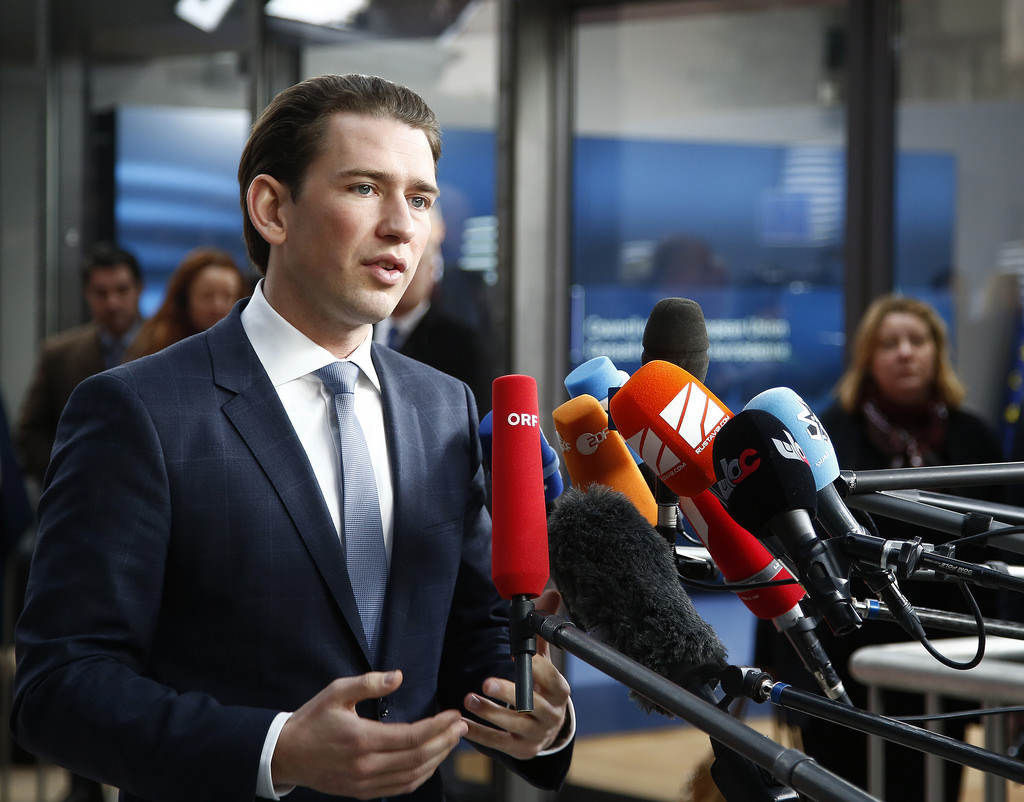It has been a little over four months that the new Austrian government has been in place. Led by the Austrian People’s Party (ÖVP) under Chancellor Kurz, a youthful enfant terrible who has given the ÖVP conservatism renewed appeal with a sharp shift to the right, the government also includes the far-right Freedom Party of Austria (FPÖ) as a junior partner.
Support for the new government
Like other elections in Europe, Kurz’s elevation to power in Austria partly represented voters’ turn against what they perceived as a self-serving political establishment. After his first 100 days in office, Kurz still has the backing of many Austrians who trust that he can deliver a departure from previous decades of Austrian politics that were marked by wheeling and dealing between the ÖVP and the Social Democrats (SPÖ).
The FPÖ has fared somewhat less well, although polls still put the party at 22 per cent of the popular vote (down by 4 per cent from its election result). The FPÖ has been caught up in scandals surrounding its Nazi heritage and continued sympathies among its leading cadres for racial ideologies; and its pro-Russian overtures have led to raised eyebrows in many European capitals.1
Focus on immigration
Yet Kurz and his coalition partners still stand united on what has been their most important campaign promise: the pledge to curb immigration. After the election, massive cutbacks to social services and financial aid available to asylum-seekers and refugees were among the first measures put in place.2 (Vice-Chancellor Strache from the FPÖ lauded this as “social fairness for Austrians”, accusing previous governments of having turned the country into a “social aid paradise for migrants”.3)
Speaking to German press, Kurz lauded the hard-line stance on migration announced by Germany’s new Interior Minister Seehofer. Europe should take countries like Australia as a role model, Kurz asserted: “They have managed to provide protection and security to people who hit the road illegally without giving them a better life in their desired country of destination. They have reduced illegal migration to almost zero. And the most important thing: They have stopped the dying.”4
Knife attack by an Afghan drug addict
When on March 8 a 23-year-old Afghan stabbed and injured four people in Vienna, the Austrian public debate quickly returned to the question of migration and security. Chancellor Kurz tweeted: “It is clear that many mistakes have been made in migration and asylum policies over the previous years. Unlimited migration is the cause of many problems were are currently facing. The new federal government thus wants to correct these mistakes from previous years.”
Klar ist, dass in d vergangenen Jahren in d Migrations-u Asylpolitik viele Fehler gemacht wurden. Unbegrenzte #Migration ist die Ursache f viele Probleme, mit denen wir derzeit konfrontiert sind. Die neue #Bundesregierung will daher diese Fehler der vergangenen Jahre beheben. 2/3
— Sebastian Kurz (@sebastiankurz) March 8, 2018
The attacker appears to have been a drug addict and small-scale dealer who was already known to the authorities. He claims to have acted out of frustration with his situation and has since attempted to commit suicide in prison.5
Assault outside the Iranian ambassador’s residence
A second knife attack in Vienna appears more politically motivated: On March 12, an Austrian citizen attempted to knife a soldier standing guard in front the Iranian ambassador’s private residence. The attacker, who was of Egyptian extraction, was shot dead by the soldier, who suffered an injury to his arm.
The precise motivations behind the assault remain unclear. A police spokeswoman asserted that from his browsing history the man appears to have had an interest in political Islam; yet no firm linkage to radical or jihadist ideologies or organisations could be established.6
This second stabbing of course poses some problem to all those seeking to lay the blame for every act of violence at the feet of migrants. After all, the 26-year-old held an Austrian passport. And senior political figures still did not dare to tweet that he was not a ‘real’ Austrian due to his ethnic background – although many were probably thinking it.
“Afghans – how dangerous are they?”
Overall, many commentators pointed out striking double standards where a violent attack is of interest only as long as it is committed by a ‘foreigner’ or at least by someone phenotypically ‘different’.
Such disproportionate attention to violent crimes committed by (Muslim) migrants has been a constant in both German and Austrian press. Austria’s public TV channel ORF responded to the first stabbing by broadcasting an investigative programme titled: “Afghans in Austria – how dangerous are they?”7
In the case of a recent knife attack in Munich just across the German border, interest in the event died down very quickly after it became clear that the perpetrator had “medium blonde hair”.8 The same dynamic could be observed with respect to a recent stabbing at a Berlin school: When it was revealed that the killer was an ethnically German classmate, interest in the case declined swiftly.
Sources
https://www.ard-wien.de/2018/03/28/oesterreichische-regierung-bilanz-nach-100-tagen/ ↩
http://www.tt.com/politik/innenpolitik/14164710-91/100-tage-schwarz-blau-kurz-und-strache-im-doppelinterview.csp ↩
https://www.welt.de/politik/ausland/article174864314/Oesterreichs-Kanzler-Sebastian-Kurz-In-Deutschland-ist-sehr-viel-Bewegung-in-die-richtige-Richtung.html ↩
https://diepresse.com/home/panorama/oesterreich/5386420/Messerattacken-in-WienLeopoldstadt_Taeter-war-Kleindealer ↩
https://www.reuters.com/article/us-austria-attack/vienna-knife-attacker-had-radical-islamist-sympathies-austria-says-idUSKCN1GP1E4 ↩
https://www.ots.at/presseaussendung/OTS_20180316_OTS0134/thema-am-19-maerz-afghanen-in-oesterreich-wie-gefaehrlich-sind-sie ↩






